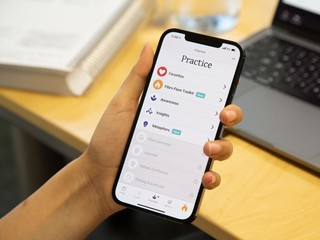 It’s estimated that 133 million Americans, or nearly half the population, suffer from at least one chronic illness, such as hypertension, heart disease, and arthritis. Many, if not all, of these patients will experience acute events, flares, and exacerbations, in which their symptoms suddenly, and often without warning, become worse.
It’s estimated that 133 million Americans, or nearly half the population, suffer from at least one chronic illness, such as hypertension, heart disease, and arthritis. Many, if not all, of these patients will experience acute events, flares, and exacerbations, in which their symptoms suddenly, and often without warning, become worse.
“While incredibly important to understand, the ability to identify and characterize flare-type events has not yet been cracked by a health informatics field largely reliant on data from within the clinic visit, or non-contextualised passive device data. This has left a significant hole,” Nell Meosky Luo, co-founder of Folia Health, a patient-centric healthcare data analytics company, told VatorNews.
Now the company is looking to fill that by launching a new feature on Thursday to help patients with tracking when their symptoms flare. Its patent-pending Flare Tracking Technology provides tools for patients and healthcare providers to monitor and manage disease flares with greater precision.
Features include real-time monitoring, where patients can tag disease activity and resolutions in real-time through Folia’s mobile app, as well as predictive analytics, with algorithms that can predict the likelihood that increased symptomatic burden is identified as a flare, so that patients can take proactive measures to manage their condition. By inputting their personal data, individuals are also given access to graphs, reports, and analysis on their own health trends.
With Flare Tracking, when a user has an escalation of symptoms, the platform will prompt them with a series of additional questions in order to track their health in more detail, see if they want to mark the day as a flare, and provide them with more information if they may need to call their provider. This flare tracking can happen in real time, as a user is experiencing a flare, or during a short-recall period afterwards.
Once an individual is alerted to answer the additional questions, they may be signaled to seek additional care from their healthcare providers if they respond as having fever, signs of infection, swelling in the abdomen, not being able to walk or do normal activities, and not getting better at home when taking pain meds. When the individual goes back to review their data from a given period of time, they are able to visualize when flares occurred, and can go back and understand specific triggers, symptoms, and other commonalities or differences between the events.
Patients have the ability to share their health data with their healthcare team, as well as to consent into prospective observational studies. With this data, healthcare providers can then create individualized care plans for that patient.
Flare Tracking is also designed to aid in the research and management of chronic conditions by analyzing flare data between clinic visits, thereby contributing to Real World Evidence and improving the understanding of chronic diseases and refining treatment strategies.
By focusing on capturing highly detailed, comprehensive data per individual, this methodology generates high-volume datasets that can provide insights more quickly and reliably, directly from the patients that experience them, Luo said.
“Folia is committed to allowing for flexible, individually-relevant assignment of measured outcomes through the way we capture data. Our ultimate goal is for researchers and drug developers to include outcomes that actually matter to the individuals experiencing the condition,” she explained.
“We envision a world where patient needs are truly at the forefront of drug development and healthcare decision-making, with patient priorities powering the next generation of data-driven healthcare.”
Founded in 2016, Folia’s current user base is roughly 30,000 individuals living with over 500 conditions. For example, the company is currently focusing on growing its communities of individuals who manage Myasthenia Gravis, Multiple Sclerosis, and Lupus.
Folia, which is free to all individuals, partners with Life Sciences and other research organizations, such as academic medical institutions and advocacy foundations, to run and publish on observational research initiatives. These customers typically use this information to advance scientific understanding of a particular condition, or help communicate to clinicians and insurance companies how new therapies impact the outcomes that matter most to patients in a particular community.
The company also partners with early development teams at pharma and biotechs to run natural history studies for poorly understood conditions, helping them prioritize patient-centric endpoints for their clinical trials in that indication.
For patients, meanwhile, the platform is meant to be intuitive, flexible, and comprehensive to the individual experience, which Luo said is in contrast to many other consumer-facing health tracking apps, instead acting as a digital notebook that mirrors everything you would write down.
“There are many manifestations of most chronic conditions, and many people live with multiple conditions; thus, rigid or point-in-time methods of data capture are unable to cover the full spectrum of disease heterogeneity,” she said.
“Allowing for the flexibility to keep track of only the symptoms and treatments that are relevant to an individual, in a structured way, unlocks a world of possibilities: for the user, a better, more relevant tracking experience, and the ability to visualize your own data; for researchers, the opportunity to leverage participant-adjusted datasets that cover the wide-net set of outcomes that matter to patients and the full impact of therapies on those outcomes.”
In many ways, flare tracking was an obvious next step to what the product already did, she explained, as the Folia platform supports patients as a disease management tool where individuals can refer to a single source of truth to help inform their care.
“Acute events and exacerbations are a common thread and important concern for many individuals living with complex/chronic conditions. This is something we constantly hear from our users. We also hear from our life science partners and clinical researchers that there is a significant gap in the true understanding of these experiences for better disease management and therapeutic development, as many people experience flares outside of a traditional health care setting,” she said.
“Therefore it was incredibly important to us at Folia to create a mechanism by which individuals can track their flares to better understand their own experience and inform their care – while making it possible for researchers to see these real-world insights at a population level.”


















